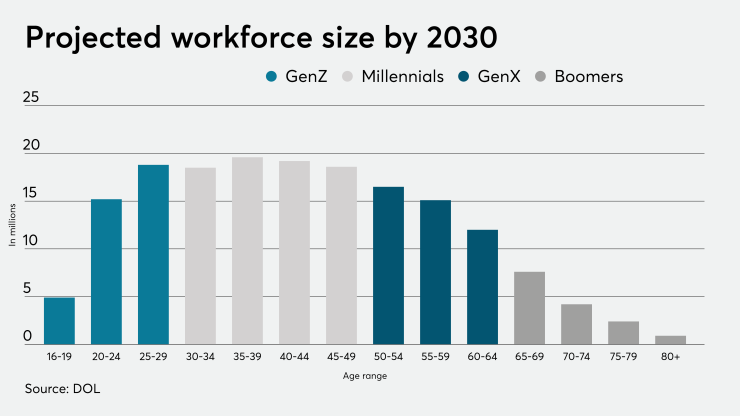NEW ORLEANS — Benefit advisers must address the five generations that now make up the U.S. workforce by moving beyond traditional healthcare and other benefit strategies to meet changing expectations, experts said on Tuesday.
As the age gap in today’s workforce is getting increasingly wide, employers need to appeal to multiple generations, ranging from Gen Z to baby boomers. New solutions may involve having an individualized communication strategy; asking employees about their preferred communication style is one key way to ease multigenerational differences, said Francisco Oller Garcia, digital operations and marketing specialist at BeniComp Health Solutions.
He noted that for healthcare planning, access to care and better information are key considerations for employers and clients to communicate as they look for better strategies.
“In everything we do, we have to find what the element that people care about is,” Oller Garcia said, speaking at a panel of Rising Stars in benefits advising, during the 2020 Workplace Benefits Renaissance conference. “So when it comes to the power of personalization, we have to think about the five generations in the workforce, and how each of them accesses and consumes healthcare is different.”
Building a health plan or benefit offering for such a diverse workforce can be a big challenge, but using technology to communicate and engage employees can help.
See also:
Gen Z does not distinguish or differentiate between a physical interaction and a digital interaction, which means that for them, being present in a digital or physical space is one in the same, said Lisa Talcott, sales executive for employee benefits at Assured Partners.
“That generation grew up with tablets in their hands in grade school, whereas I didn't grow up with computers until maybe high school,” she said, speaking at the same panel.
What you grow up with creates a comfort level, which determines what you're open to adapting to, Talcott said.
“I've heard a baby boomer say ‘you know, I love it when Gen Z or Gen Y show me how to navigate technology because I just don't know it's there until they show me how to do it. And in turn, I just wish they would be open to letting me share my knowledge about life skills.’ So that transfer of knowledge, I think is where there's a great opportunity,” Talcott said.
Even though the digital revolution has changed the way HR operates, and how benefits are communicated and offered, the future of advising shouldn’t solely revolve around tech solutions, said panelist Zain Hasan, managing director at Risk Strategies Company and one of
“There’s something I call the rise of emotional intelligence, and I think that's what’s going to stand in the difference of whether or not someone can succeed in the future of advisers in general,” Hasan said. “Because it's the things that you can't necessarily learn. We hear about the concept of automation and AI, and we’re being able to augment a lot of roles. But you can't augment emotional intelligence.”
Being able to connect emotionally with clients matter. Oller Garcia noted that his personal experiences have given him an insight that “people have much larger health problems that go beyond the physical.” He says there are financial stress, mental health and many other factors that benefit advisers have to account for. These things have impacted the way Oller Garcia, who is a millennial, advises clients and works with the C-suite, he says.
“When I roll into a meeting, it's something I can't really hide,” said Oller Garcia, who has used a wheelchair since being born with a genetic condition that affects his mobility. ”So in a way, that gives me credibility because there are many people who have experienced healthcare, but not since the day they were born, as I have.”






